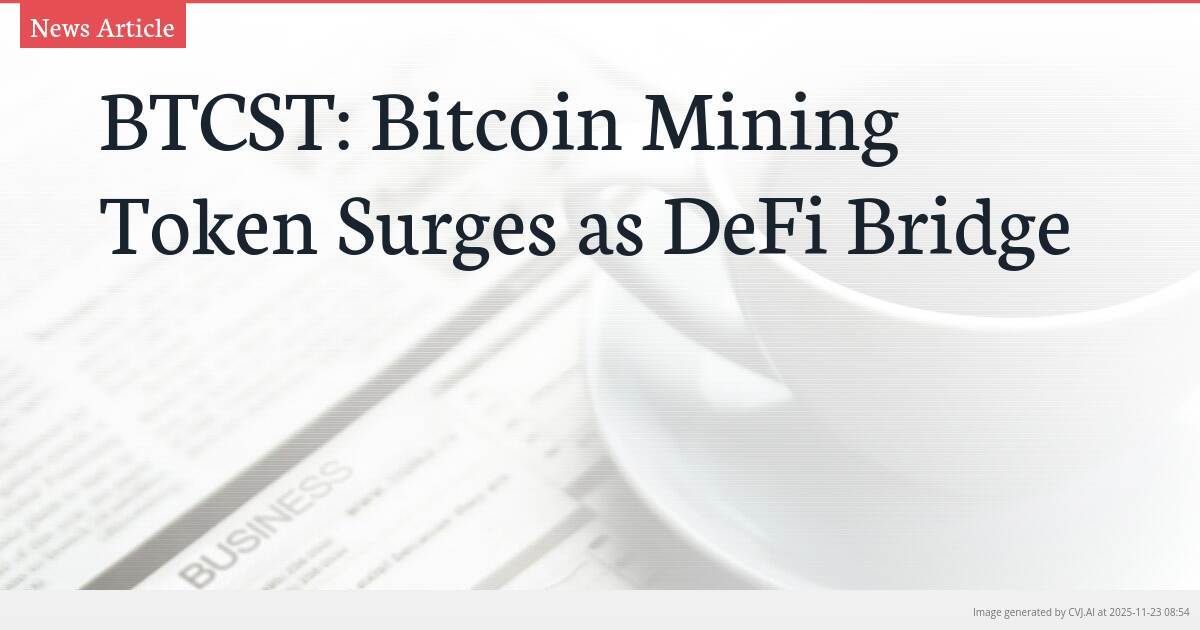Introduction
BTCST is revolutionizing Bitcoin mining access through DeFi innovation, connecting traditional Bitcoin mining with decentralized finance to allow users to earn mining rewards without operating physical equipment. As China’s mining crackdown reshapes the industry and El Salvador embraces volcanic energy mining, this Binance Smart Chain token has demonstrated both volatility and resilience, with recent market movements sparking renewed interest in this unique financial instrument that represents actual Bitcoin mining power.
Key Points
- Each BTCST token represents 0.1 Th/s of actual Bitcoin mining power, providing direct exposure to mining rewards
- The project maintained mining rewards during Bitcoin's hashrate crash in July 2021, delivering up to 34% higher returns to stakers
- Community governance with zero team allocation makes all project decisions through voting mechanisms
The DeFi Bridge to Bitcoin Mining
BTCST, or Bitcoin Standard Hashrate Token, represents a groundbreaking approach to democratizing Bitcoin mining access through decentralized finance. Each BTCST token is collateralized with 0.1 Th/s of actual Bitcoin mining power, providing holders with direct exposure to mining rewards without the complexities of operating physical mining equipment. The project operates entirely on Binance Smart Chain as a community-governed initiative with zero team reserves, making all project decisions through community voting mechanisms rather than centralized authority.
The timing of BTCST’s emergence proved particularly relevant as China’s crackdown on cryptocurrency mining operations in May 2021 forced the relocation of expensive mining equipment out of the country. This disruption created significant challenges for traditional mining operations while simultaneously highlighting BTCST’s value proposition: providing a seamless way for anyone to enter or exit Bitcoin mining exposure through simple token staking. The project’s community-based structure and lack of centralized control position it as a truly decentralized alternative to traditional mining operations.
Hashrate Dynamics and Price Performance
The relationship between BTCST’s price and Bitcoin’s network hashrate has been both complex and revealing. During the May 19 market crash that shook the entire crypto ecosystem, Bitcoin’s hashrate experienced a steep decline that directly impacted BTCST’s price. However, the token demonstrated remarkable resilience in July 2021 when, according to a BTCST tweet from July 24, 2021, the Standard Hashrate Group maintained a consistent hashrate of 150 Pentahashes despite significant declines in Bitcoin’s mean hashrate.
This operational stability during network turbulence resulted in rewards increasing by up to 34% for BTCST stakers, as each terahash per second of mining power yielded more Bitcoin due to the network’s mining difficulty adjustment downward. The project’s ability to maintain consistent mining output during periods of network volatility highlights the advantage of professional mining operations over individual mining efforts. Recent technical analysis indicates BTCST has bounced from its second bottom and shows bullish strength, though it currently faces resistance levels that will determine its near-term price trajectory.
El Salvador Expansion and Future Prospects
The Standard Hashrate Group is positioning itself at the forefront of Bitcoin’s geographical redistribution following China’s mining exodus. In a September 7, 2021 tweet, the group hinted at significant developments in El Salvador, which recently became the first country to adopt Bitcoin as legal tender. This alignment with El Salvador’s initiative to mine Bitcoin using volcanic energy represents a strategic move toward greener energy resources for Bitcoin mining.
The potential expansion into El Salvador’s volcanic energy mining initiatives could provide BTCST with both environmental credentials and operational stability. As more miners shift to countries offering renewable energy resources, BTCST’s model of tokenizing hashrate could become increasingly valuable. The project’s community governance structure allows token holders to participate in decisions regarding such expansions, maintaining the decentralized ethos while pursuing strategic growth opportunities in emerging Bitcoin mining hubs.
Market Accessibility and Trading Infrastructure
BTCST’s integration with major trading platforms like Pionex and its availability on exchanges including Binance and FTX has enhanced its accessibility to retail and institutional investors alike. The token’s compatibility with automated trading tools like Pionex’s free GRID bot enables users to trade within specified intervals automatically, providing additional utility beyond simple staking for mining rewards. This infrastructure support has been crucial for BTCST’s growth, particularly as it navigates the volatile cryptocurrency markets.
Launched in December 2020 with an initial supply of 1 million BTCST tokens, the project allocated only 4% of the initial circulating supply to Binance, with the remainder going to initial tokenizing miners. This distribution model, combined with zero team reserves, has fostered community trust and aligned incentives between token holders and the network’s mining operations. As the cryptocurrency ecosystem continues to mature, BTCST’s unique position at the intersection of Bitcoin mining and DeFi innovation positions it as a compelling case study in tokenized real-world assets.
📎 Source reference: coincodecap.com

